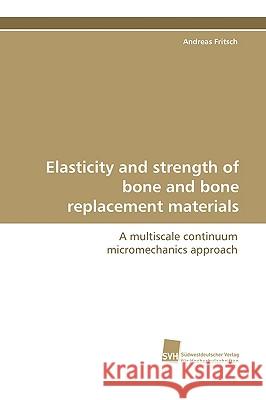Elasticity and Strength of Bone and Bone Replacement Materials » książka
Elasticity and Strength of Bone and Bone Replacement Materials
ISBN-13: 9783838105079 / Angielski / Miękka / 2009 / 188 str.
Strength of bone and bone replacement materials are predicted, from their composition and microstructure, by means of multiscale models. The theoretical developments are supported by comprehensive experiments on cortical bone and on biomaterials made of hydroxyapatite, glass-ceramic, and titanium. Brittle failure of interfaces between isotropic, spherical crystals is investigated as well as an alternative approach using crystal needles for hydroxyapatite biomaterials. A model for cortical bone strength is presented, based on a new vision on bone material failure: mutual ductile sliding of hydroxyapatite mineral crystals along layered water films is followed by rupture of collagen crosslinks. It can satisfactorily predict the strength of different bones from different species, on the basis of their mineral/collagen content, their porosities, and the mechanical properties of hydroxyapatite and (molecular) collagen.
Strength of bone and bone replacement materials are predicted, from their composition and microstructure, by means of multiscale models. The theoretical developments are supported by comprehensive experiments on cortical bone and on biomaterials made of hydroxyapatite, glass-ceramic, and titanium. Brittle failure of interfaces between isotropic, spherical crystals is investigated as well as an alternative approach using crystal needles for hydroxyapatite biomaterials. A model for cortical bone strength is presented, based on a new vision on bone material failure: mutual ductile sliding of hydroxyapatite mineral crystals along layered water films is followed by rupture of collagen crosslinks. It can satisfactorily predict the strength of different bones from different species, on the basis of their mineral/collagen content, their porosities, and the mechanical properties of hydroxyapatite and (molecular) collagen.











